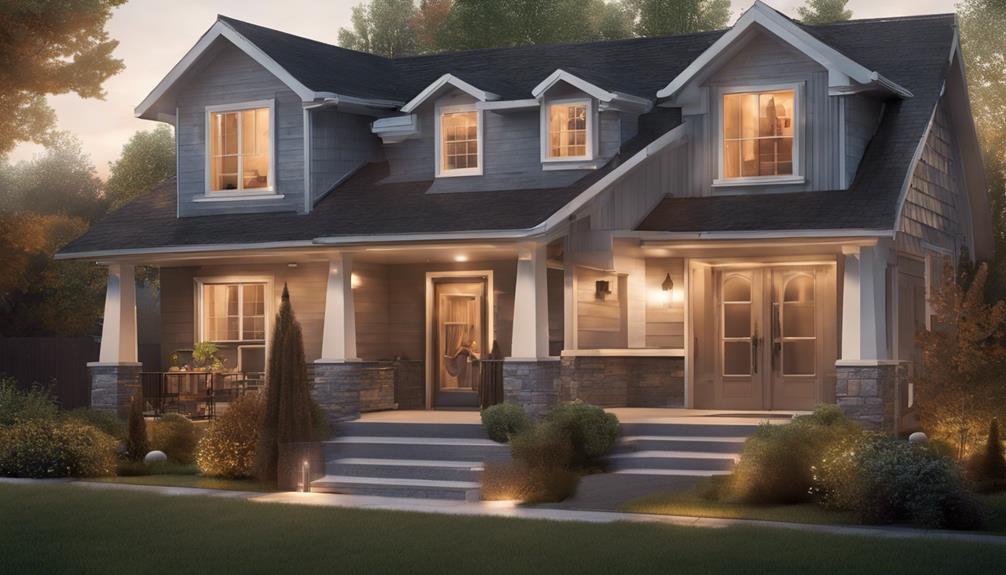To save money on home security, assess your home's needs and focus on vulnerable spots like poorly lit areas and accessible windows. Invest in budget-friendly DIY solutions and smart home devices like cameras, motion sensors, and smart locks. Leverage existing gadgets—old phones or tablets can become effective security tools with the right apps. Opt for self-monitoring systems to avoid monthly fees and consider joining community watch programs. Seek out discounts and promotions from security companies, especially during holidays. Finally, enhance physical security with deadbolt locks and motion-sensor lights. Staying informed on these tips can lead to significant savings.
Key Takeaways
- Use DIY Security Kits: Opt for DIY security systems to avoid professional installation fees.
- Leverage Existing Devices: Repurpose old smartphones and tablets as security cameras or control panels.
- Seek Promotional Deals: Look for discounts and promotions from home security companies, especially during holidays.
- Join Community Watch Programs: Collaborate with neighbors to share monitoring responsibilities and reduce costs.
- Consider Bundling Services: Bundle home security with internet or cable services for potential cost savings.
Assess Your Security Needs
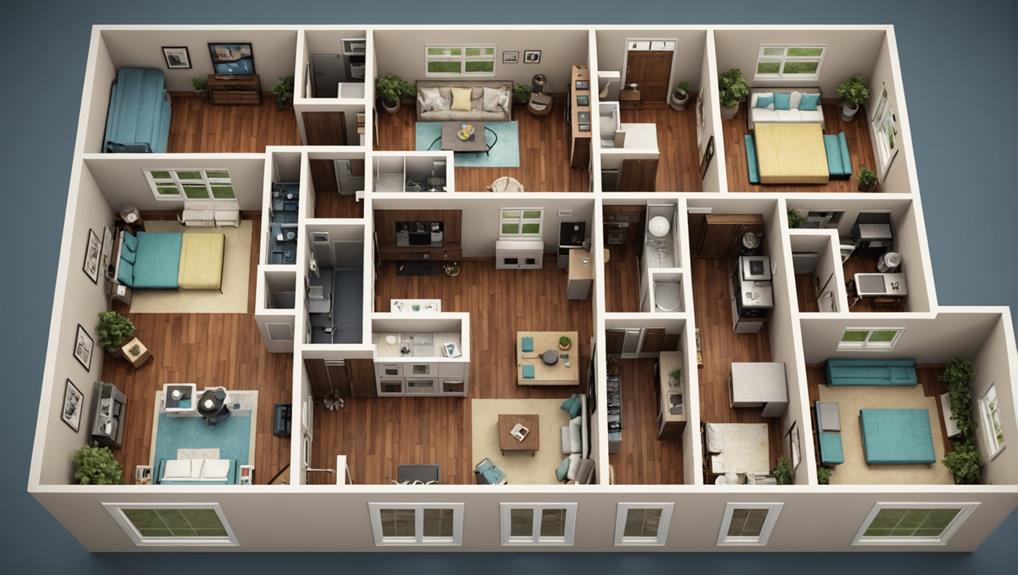
Before diving into purchasing any security equipment, take a moment to evaluate your security needs. This step is essential for saving on home security and ensuring you don't overspend on unnecessary gadgets.
Start by examining the vulnerabilities in your home. Are there specific areas that require more attention, like poorly lit entrances or accessible windows? Identifying these can help you focus on affordable security strategies that target your home's weak points. Knowing when to upgrade can also prevent you from spending on outdated or ineffective systems.
Next, reflect on the level of security you actually need. Not every home requires a top-of-the-line system. By understanding your specific needs, you can avoid overpaying for features you'll never use. This kind of strategic planning goes a long way in reducing security costs, making it easier to serve your household and community more effectively.
Don't forget to think about your neighborhood's general safety. Chat with neighbors or local law enforcement to get a sense of common security issues. This community-focused approach not only builds stronger relationships but also helps you find cost-effective solutions tailored to your environment.
Invest in DIY Solutions
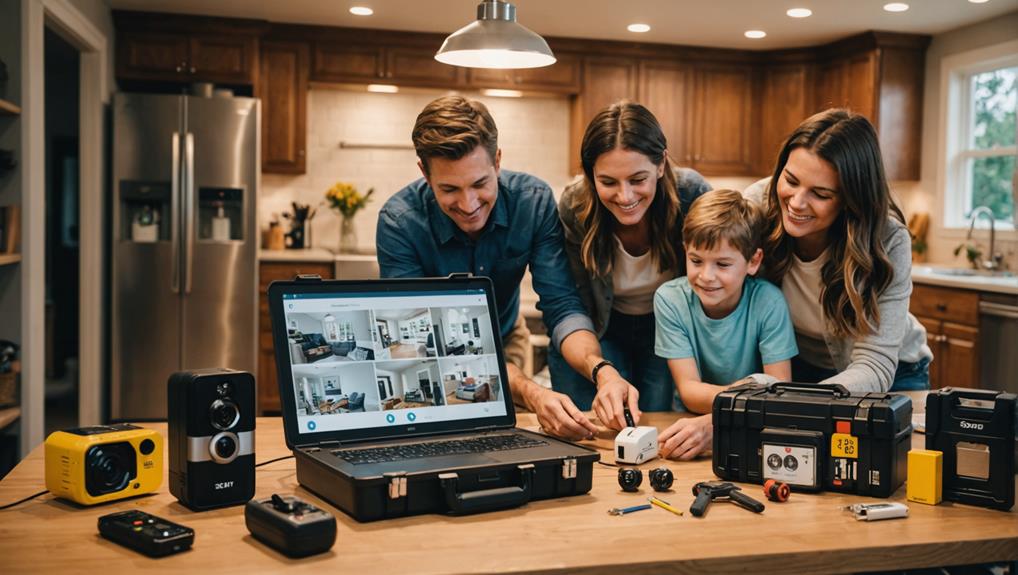
To save on home security, you can invest in affordable smart home devices like cameras and sensors.
These gadgets often come with easy installation steps, allowing you to set up your system without professional help.
It's important, however, to follow a step-by-step guide to avoid common mistakes during installation.
You'll enhance your security while keeping costs low.
Affordable Smart Home Devices
When it comes to enhancing your home security without breaking the bank, affordable smart home devices are a game changer. These budget-friendly protection options offer you peace of mind while keeping your wallet happy. One of the most effective cost-saving tips is to invest in smart cameras, motion sensors, and doorbell cameras. These devices allow you to monitor your home remotely, giving you real-time alerts and footage.
By opting for these smart solutions, you're not only saving money on security but also adding a layer of convenience to your life. For example, smart locks let you control access to your home from your smartphone. You can let in trusted visitors while you're away, making your home safer and more accessible.
Additionally, many smart home devices are compatible with each other, allowing you to create an all-encompassing security system over time. You can start small and expand as your budget allows, ensuring you're always adding value without overspending.
Incorporating these affordable devices into your home security plan demonstrates your commitment to protecting your loved ones and your property. These cost-effective solutions make it easier than ever to maintain a secure and welcoming home environment.
Easy Installation Steps
Installing your own home security system can be both empowering and cost-effective, making it a great option for budget-conscious homeowners. By embracing DIY solutions, you can take full control of your home's safety while reducing security expenses.
Here's how you can get started with ease:
- Choose the Right System: Look for DIY home security kits that offer home security discounts. These kits are often more affordable and user-friendly.
- Read the Manual: Before diving in, thoroughly read the installation guide. This guarantees you understand each step and prevents costly mistakes.
- Gather Tools: Have basic tools like a screwdriver, drill, and level handy. This will streamline your installation process.
- Install Cameras and Sensors: Follow the instructions to place cameras and sensors strategically around your home. Focus on entry points like doors and windows.
- Test the System: Once installed, test all components to confirm everything works correctly. This step is essential for your peace of mind.
Utilize Smart Home Technology
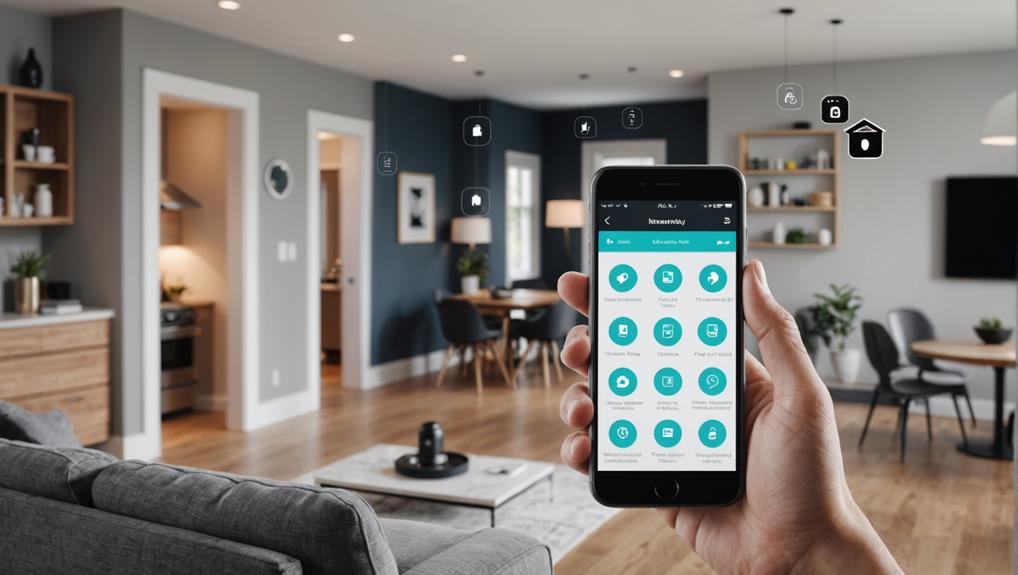
Ever wondered how you can enhance your home security without breaking the bank? Embracing smart home technology is a fantastic way to do just that. By integrating smart devices, you can increase security while saving money and keeping an eye on everything from anywhere.
Modern systems often feature integrated alarms that work seamlessly with other smart devices to provide thorough protection.
Start with smart doorbells and cameras. These devices let you monitor your home in real-time through your smartphone. You can even receive alerts if someone approaches your door, giving you the ability to act swiftly if needed.
There are budget-friendly options that don't compromise on quality or features.
Next, consider installing smart locks. They offer keyless entry, making it easier for you and your loved ones to access your home while keeping intruders at bay. Many smart locks allow you to create temporary codes for guests, adding an extra layer of convenience and security.
Smart lighting is another cost-effective way to deter burglars. You can schedule lights to turn on and off, simulating your presence even when you're not home.
This simple step can make a big difference in keeping your home safe.
Leverage Existing Equipment
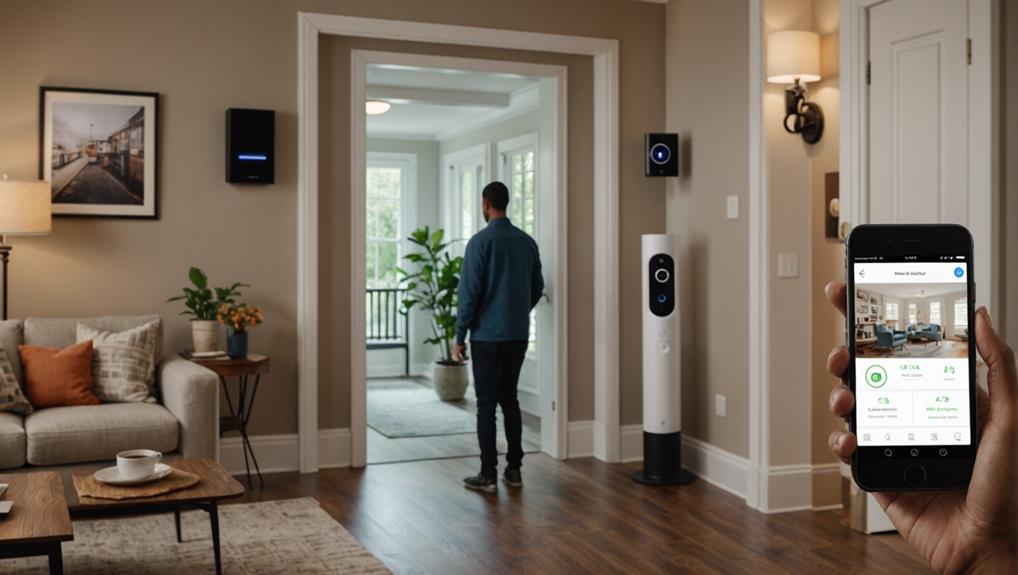
Look around your home for old devices you can repurpose for security. Many gadgets can gain new life with simple software upgrades, saving you money.
This approach not only reduces waste but also gives you more control over your home security setup, much like the benefits highlighted in DIY security system installations.
Instead of buying new, make the most of what you already have.
Reuse Old Devices
When considering how to save money on home security, don't overlook the potential of reusing old devices. Instead of discarding older technology, think about how it can serve your home security needs.
Many items you already have can be repurposed effectively, saving you both time and money.
Here are some ideas to get you started:
- Old Smartphones: Use them as security cameras by installing a home security app.
- Tablets: Turn them into control panels for your smart home system.
- Webcams: Set them up as surveillance cameras for key areas in your home.
- Routers: Repurpose them as range extenders to guarantee your entire home has strong Wi-Fi coverage.
- Speakers: Integrate them into your smart home system to receive alerts and notifications.
Upgrade With Software
Reusing old devices isn't the only way to save on home security; you can also upgrade your existing equipment with software enhancements. Many security systems offer firmware updates that improve functionality without requiring new hardware. By keeping your software up-to-date, you'll enhance your system's capabilities and potentially reveal new features like advanced motion detection or more efficient energy use.
Consider investing in smart home integration. Many existing security cameras and alarms can connect with smart home hubs like Amazon Alexa or Google Home. This connectivity allows you to manage your security system remotely, receive real-time alerts, and even control other smart devices in your home.
It's about making your current setup smarter and more responsive to your needs.
Additionally, look into security apps that add value to your existing hardware. Apps like Alfred or Manything can turn old smartphones into additional security cameras, maximizing your resources.
These applications often come with free tiers, so you won't need to spend extra money.
Explore Affordable Monitoring Options
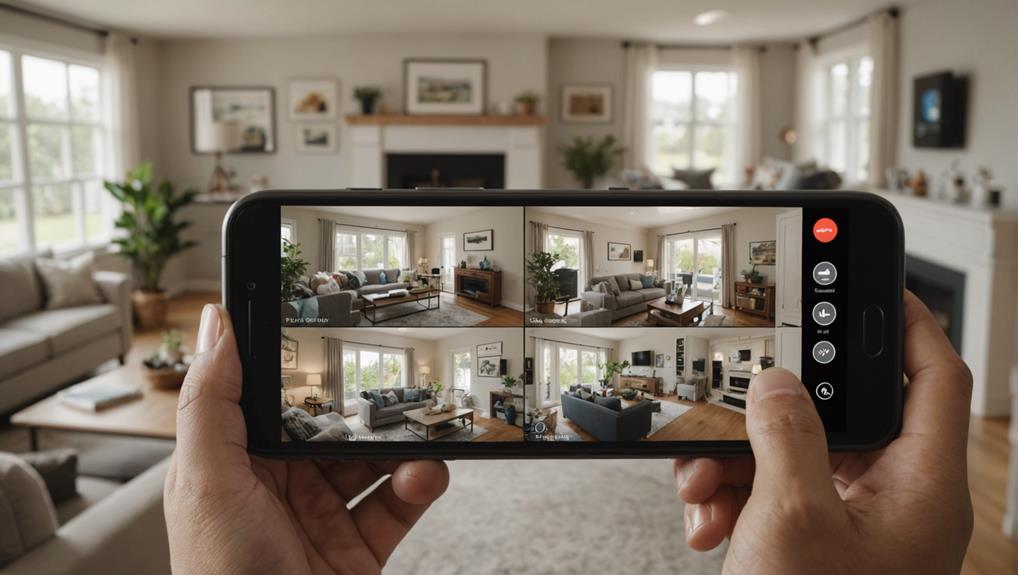
Finding cost-effective ways to monitor your home doesn't have to be a challenging task. You can guarantee your home is safe without breaking the bank by exploring various affordable monitoring options. Not only can these solutions give you peace of mind, but they also allow you to focus more resources on serving others in your community.
According to Affordable Security Solutions for Every Homeowner, there are numerous options available to suit different needs and budgets. Here are some budget-friendly options to take into account:
- DIY Security Systems: These systems often come with easy-to-install sensors and cameras. You can monitor them yourself, avoiding monthly fees.
- Local Alarm Monitoring Services: Smaller, local companies might offer competitive rates compared to national brands. They often provide personalized service, too.
- Smart Home Devices: Devices like smart doorbells and cameras can be monitored via your smartphone. Many offer free basic plans with no recurring charges.
- Community Watch Programs: Teaming up with neighbors can enhance security at a low cost. Shared monitoring and communication can deter potential threats.
- Bundling Services: Some internet or cable providers offer security monitoring as part of a package deal, which can lower overall costs.
Take Advantage of Discounts
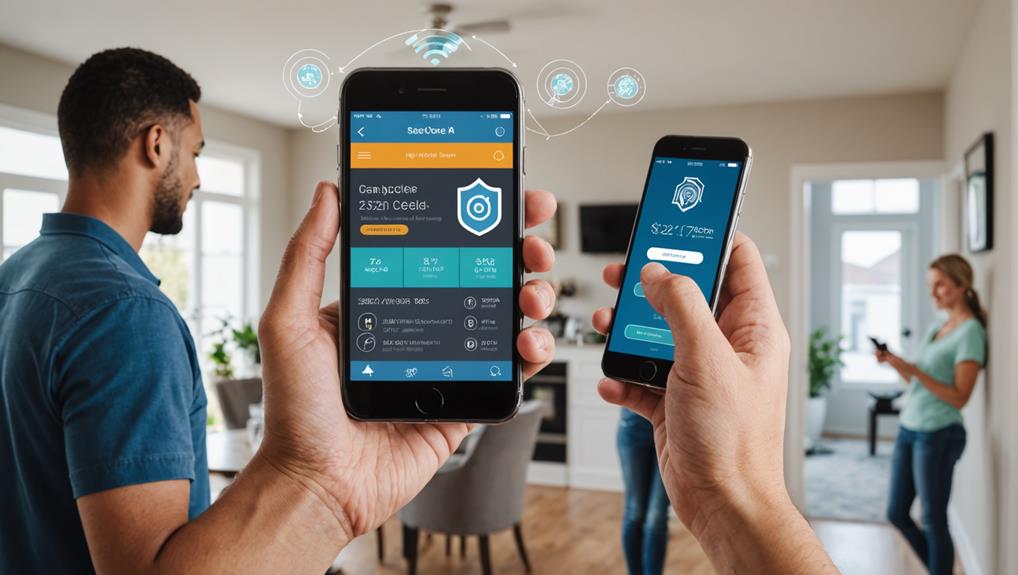
In addition to exploring affordable monitoring options, you can greatly cut costs by taking advantage of discounts. Many home security companies offer promotional deals, especially during holidays or special events.
Keep an eye out for these opportunities—sign up for newsletters or follow companies on social media to stay informed about upcoming discounts. For instance, DIY vs. Professional security systems often have varied cost structures, and keeping an eye on promotions can help you make an informed choice.
Don't hesitate to ask for a discount. Whether you're a new customer or a loyal one, expressing interest in a deal can sometimes lead to unexpected savings.
If you're a member of organizations like AAA or AARP, you might qualify for additional discounts. Similarly, some employers offer partnerships with security companies that include special rates for employees. It's worth checking your benefits package to see if such offers exist.
Referrals can also be a great way to save. Many security providers have referral programs where you and the person you refer can receive discounts or credits.
This not only helps you save money but also allows you to help others enhance their home security affordably.
Taking these steps won't just save you money; they'll also allow you to allocate your resources more effectively, helping you serve others better.
Enhance Physical Security Measures
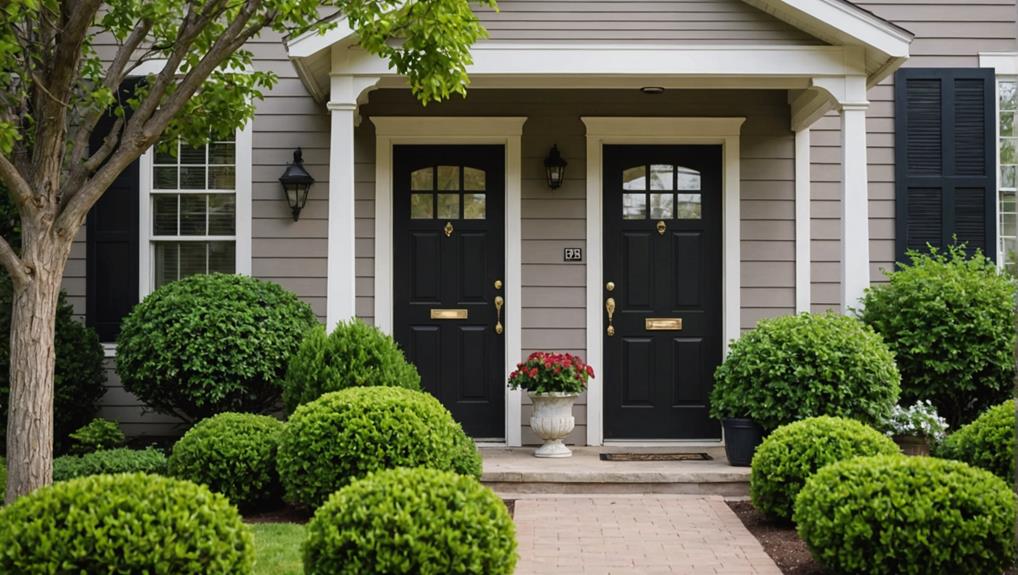
Boosting your home's physical security measures can greatly enhance your overall safety without breaking the bank.
By focusing on simple yet effective strategies, you can protect your home and loved ones while keeping costs low.
Here are some practical steps you can take to fortify your home:
- Install Deadbolt Locks: Upgrade your door locks to deadbolts, which are harder for intruders to breach. When selecting a deadbolt, consider the most secure and reliable lock for your home's front door to guarantee maximum protection.
- Reinforce Entry Points: Strengthen doors and windows with security bars or grilles to deter break-ins.
- Outdoor Lighting: Place motion-sensor lights around your property to illuminate dark areas and scare off potential intruders.
- Trim Landscaping: Keep bushes and trees trimmed to eliminate hiding spots around your home, making it less attractive to burglars.
- Secure Sliding Doors: Use a sturdy rod or bar in the track of sliding doors to prevent them from being forced open.
Frequently Asked Questions
How Can I Prevent False Alarms From My Security System?
You can prevent false alarms by routinely checking your system's components and ensuring they're in good condition.
Educate everyone in your household on how to properly use the system. Use pet-friendly sensors to avoid triggering alarms with your pets.
Regularly replace batteries and keep your contact information updated with your security provider.
What Are the Legal Implications of Installing Security Cameras in My Home?
You should know the legal implications of installing security cameras in your home.
Make certain you're respecting privacy laws by not placing cameras in private areas like bathrooms or bedrooms.
Always inform guests about the presence of cameras.
It's also essential to check local regulations regarding audio recording, as it might require consent.
Understanding and following these laws guarantees you're protecting others while securing your home effectively.
How Do I Choose the Best Location for Security Cameras?
To choose the best location for security cameras, start by identifying vulnerable areas like entry points, driveways, and backyards.
Make sure cameras cover these spots effectively. Install them at high, unobstructed positions to avoid tampering and capture clear footage.
Consider lighting conditions for ideal visibility.
Are There Any Tax Benefits for Installing Home Security Systems?
Yes, you can get tax benefits for installing home security systems.
If you're running a home business or using part of your home exclusively for work, you might be able to deduct some of the expenses.
Remember, always check the latest IRS guidelines or consult a tax professional to ascertain you're eligible.
Seeking ways to protect your home and save money means you're caring for your family and community's safety.
How Do I Maintain My Security System to Ensure It Stays Effective?
To maintain your security system's effectiveness, perform regular checks and tests.
Replace batteries in sensors and cameras promptly.
Update the system's software to protect against new threats.
Clean cameras and sensors to guarantee clear functionality.
If you notice any issues, address them immediately.
Conclusion
By evaluating your security needs and investing in DIY solutions, you can save money on home security. Utilize smart home technology and leverage existing equipment to cut costs further. Explore affordable monitoring options and always take advantage of available discounts. Enhance physical security measures to add another layer of protection. With these tips, you'll keep your home safe without breaking the bank. Remember, a secure home doesn't have to be an expensive one.

